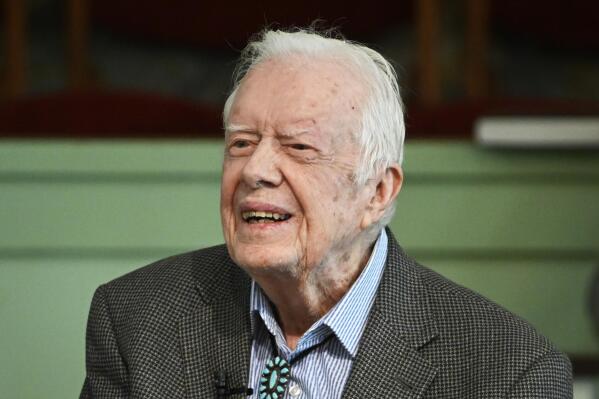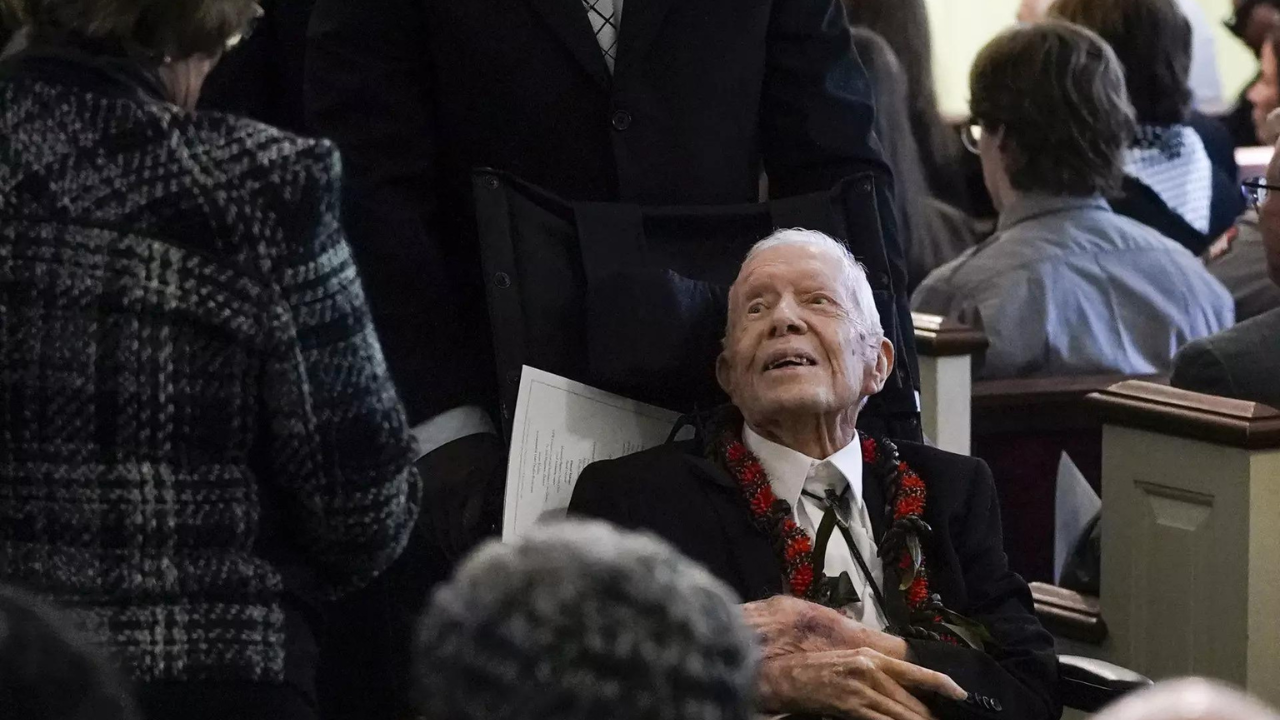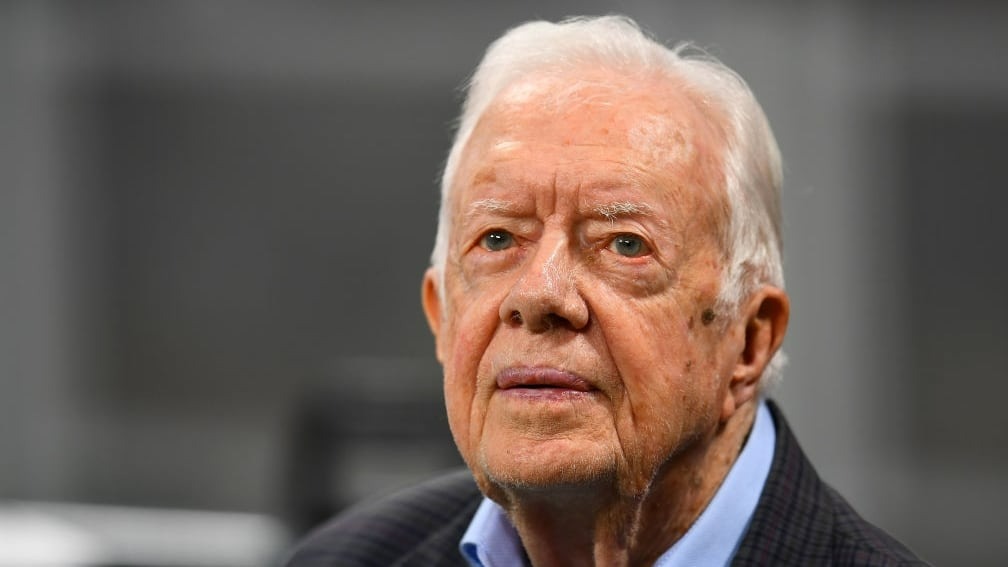Jimmy Carter, the 39th President of the United States and one of the most respected figures in American public life, has entered hospice care at the age of 99. According to an official statement released by The Carter Center, the former president made the decision to forgo further medical treatment following a series of brief hospital stays. Carter is now spending his remaining time at home in Plains, Georgia, surrounded by his family and close friends, in accordance with his wishes.
This news has prompted an outpouring of admiration and gratitude from across the globe. As one of the longest-living presidents in U.S. history, Carter’s enduring legacy extends far beyond his time in office. From his tireless humanitarian work to his commitment to global peace and democracy, Carter’s life stands as a powerful testament to public service, humility, and resilience.
A Brief Overview of Jimmy Carter’s Presidency
Jimmy Carter served as the 39th President of the United States from 1977 to 1981. Before his presidency, he was the Governor of Georgia and had a background as a peanut farmer and U.S. Navy officer. As president, Carter prioritized human rights in foreign policy, launched key energy initiatives, and navigated economic challenges during a period of rising inflation and unemployment.
One of the most significant accomplishments of Carter’s presidency was the 1978 Camp David Accords, which led to a historic peace agreement between Egypt and Israel. This diplomatic breakthrough remains one of the most celebrated achievements in Middle East peace efforts and earned Carter international recognition as a peacemaker.
Though his administration faced challenges, including the Iran hostage crisis and economic difficulties, Carter remained deeply committed to ethical governance, transparency, and human rights.
Life After the Presidency: A Global Humanitarian
Unlike many former presidents who retire from public life, Jimmy Carter became even more active after leaving the White House. In 1982, he and his wife, Rosalynn Carter, founded The Carter Center, a nonprofit organization committed to advancing human rights and alleviating human suffering.
Under his leadership, The Carter Center has led public health campaigns to combat diseases such as Guinea worm, river blindness, and malaria. According to the World Health Organization and the U.S. Centers for Disease Control and Prevention (CDC), the Center’s health initiatives have helped reduce the global burden of neglected tropical diseases, saving millions of lives and improving conditions in some of the world’s poorest regions.
The Carter Center has also played a critical role in monitoring democratic elections around the world. As of 2024, it has observed over 110 elections in more than 40 countries to help ensure transparency and fairness in democratic processes.
Accolades and Recognition
Jimmy Carter’s contributions to peace and humanitarianism were recognized globally when he received the Nobel Peace Prize in 2002. The Nobel Committee cited his decades of untiring effort to find peaceful solutions to international conflicts, promote democracy and human rights, and advance economic and social development.
In addition to the Nobel Prize, Carter has been the recipient of numerous awards and honors, including the Presidential Medal of Freedom, the Congressional Gold Medal, and honorary degrees from respected academic institutions worldwide.
Personal Life and Devotion to Community
Born on October 1, 1924, in Plains, Georgia, Jimmy Carter has maintained a close connection to his hometown throughout his life. He and Rosalynn Carter have lived in the same modest house in Plains for decades, embodying a rare humility for a former head of state.
Together, the Carters were actively involved in their local church and community service. They notably partnered with Habitat for Humanity, a global nonprofit that builds affordable housing. Even well into his 90s, Carter was seen working on construction sites to help build homes for those in need.
Their marriage, which began in 1946, has been widely recognized as one of the most enduring and supportive partnerships in political history. Rosalynn Carter passed away in November 2023 at the age of 96, marking the end of their 77-year marriage. Her passing was met with widespread mourning and recognition of her tireless work as an advocate for mental health and caregiving.

Carter’s Decision to Enter Hospice Care
On February 18, 2023, The Carter Center announced that Jimmy Carter had decided to receive hospice care at home after a series of short hospital stays. This decision came after consultation with his medical team and family, and it reflects his preference for comfort-focused care rather than additional medical intervention.
Hospice care is a specialized type of healthcare designed to provide compassionate support for individuals with terminal illnesses, prioritizing quality of life and dignity. According to the National Hospice and Palliative Care Organization, hospice services are typically provided in the home, enabling patients to remain in a familiar environment and surrounded by loved ones.
Carter’s decision underscores the former president’s long-standing values: simplicity, family, and grace in the face of life’s challenges.

Public Response and Tributes
In the months following the announcement, tributes and messages of support poured in from across the United States and abroad. Political leaders, nonprofit organizations, and private citizens have shared memories, reflections, and appreciation for Carter’s lifelong service to humanity.
Many social media users and public figures have praised Carter not just for his political leadership, but for the way he lived after leaving office—with integrity, compassion, and a sense of global responsibility.
Organizations such as the United Nations, the World Health Organization, and Amnesty International have highlighted the impact of Carter’s work in health, peace, and human rights.

Legacy That Will Endure
As Jimmy Carter spends his remaining days surrounded by family and friends, the world reflects on a legacy built not on wealth or power, but on purpose. His post-presidency achievements arguably rival or even surpass his presidential accomplishments—a rare distinction in American political history.
His emphasis on peaceful conflict resolution, his commitment to disease eradication in underserved countries, and his tireless advocacy for democratic principles continue to influence generations of leaders and activists.
The Carter Center remains an active force for good, guided by the vision and moral compass of its founder. Even as Carter steps back from public life, the work he initiated continues to benefit millions worldwide.

Conclusion
Jimmy Carter’s life stands as a model of humility, public service, and global citizenship. From the peanut fields of Georgia to the White House and beyond, he has consistently demonstrated a deep commitment to justice, peace, and human dignity.
As the 39th President of the United States enters hospice care, his legacy serves as a reminder that leadership is not only about holding office, but about what one does with the time and influence granted. The gratitude expressed by people around the world reflects the deep and lasting impact of a life well lived.
